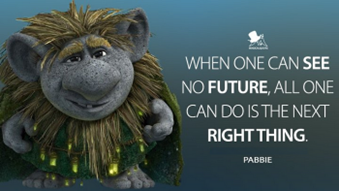“Just Do the Next Right Thing”
7 March 2023
Regular readers will know that I am partial to collecting new business terminology. Usually this language comes from an academic or a business expert, but today, I offer you a phrase popularized by Grand Pabbie from Frozen 2.
Created by Disney as the wise sage of Arendelle, able to turn from bulbous rock into moss topped troll in a few seconds, Pabbie is there to offer, albeit slightly cryptic, advice to Elsa and Anna when they most need it. His advice in the first Frozen film was really quite dubious however and could definitely have benefited from more precision – his ‘fear Elsa’s powers’ warning tore two sisters, and consequently their whole family, apart (can you be a bit more specific in future Grand Pabbie and maybe offer some hint of a solution within your wily mutterings?! Perhaps tell the King and Queen to not get on that boat whilst you are at it).
However, he seems to have pulled himself together by Frozen 2 and his advice is altogether more practical. To the point where Anna sings a whole song around the “do the next right thing” concept to help her through her darkest moments when contemplating the death of her sister. It’s a deeply poignant moment in the film and one that induced hot, fat, blubbery tears from me when I watched it for the first time. I have to confess that when watching this film (multiple times) with my daughter, it never entered my head that it was astute business advice and yet I’ve heard the phrase “do the next right thing” discussed in a business context twice in the last two weeks!
The first was by Dave Snowden within an interesting seminar as part of a “Trans-Atlantic Conversations” Audit Wales series where he was talking about the “Vector Theory of Change” and how his company helps organisations to codify conversations to determine the travel of organizational improvement. I have seen Snowden talk about his approach to organizational complexity a few times and I have to confess, that, perhaps unsurprisingly, I have found his approach ‘complex’. My approach to organizational change is to demystify and simplify. It took me quite a long time to truly appreciate and grasps the concepts of lean and I take pride in trying to convey these concepts as simply and quickly as possible to others. That’s not to say that I think making ‘lean’ change happen is simple, it absolutely isn’t, but often what you are trying to achieve is simple. I think it’s important for all employees to get onboard with the journey, and critically, for leaders to build improvement as part of their approach to leadership. The getting what you are trying to achieve done is hard, but the aims absolutely shouldn’t be. I think too often people forget about the aims: making the service experience better, improving quality levels, reducing the end-to-end lead time of delivery – so I was delighted to hear Snowden discuss complexity theory in a way that I was able to understand it (I think). His approach helps leaders to better understand the direction of change, by analysing stories from people on the ground, encouraging leaders to do ‘more of what works’ and to ‘keep doing the next right thing‘. Listening to their approach being described it felt like it was very accepting of the messiness of change, but that with some analysis, a change leader could help to make tweaks and help to steer the direction of change.
The second time the phrase was uttered was at the ACCA St David’s Day Breakfast in the Hilton Hotel where Noel Mooney, Chief Executive of the Football Association of Wales, was reflecting on the Wales’ team time in Qatar and the importance of good governance and adherence to organizational values. Noel gave an authentic and honest account of how difficult managing the complexity of Wales’ presence in a country full of human rights violations was and that moral and ethical decisions were flying at him every hour. The approach that he adopted was to hold true to the FAW’s values and to simply ‘do the next right thing’ in the face of every decision. It helped him to navigate a path through the complexity.
Described in this way does help to demystify the pain of high risk decision making. And following this ‘do the next right thing’ practice can help you to better understand and direct change. Yes, the power of the small things isn’t to be ignored and I resolve to focus on the importance of doing the next right thing in future!

- Working Smarter and Harder to Overcome Friction
- Mesmerising Mnemonics
- Recharging Batteries
- Marketing Magic
- What’s My Job Again?
- The Reports Have Gone to Her Head
- Cross Stitch Standards and Creativity
- Hefin David and the Aeroplane Arms
- Hankering for a Handbook
- Window of Light
- Defensive Organising
- McMullin’s Tandem of Co-Production
- The Joy of John Parry-Jones
- The Perils of Disappointment
- The Shield of Shame
- Customer Care and Organisation Innovation
- Hooray for Humanity!
- Angry Lemons
- Double Meanings
- Ticketing Masterplans
- When will it all end …
- Lifetime Loyalty and Taylor Swift
- Looking at Things Differently
- Networking Noodles
- Addicted to Truth
- Designs on Service Design
- The Multiple Joys of Universal Design
- Hungry Cultures
- Event Lean
- The Traffic Analogy
- Moving on Up
- Rosé Cava Revolution?
- Powerpoint Sneaky Lean
- Writing about Writing
- ChatGPT Response: Exploring the Art of Expression: Unveiling the Magic of Writing in the Style of Sarah Lethbridge
- Help to Grow Coldplay Style
- Caring IS Everything!
- Institutional Flapping
- “Just Do the Next Right Thing”
- Trust Thermoclines
- February 2026 (2)
- December 2025 (1)
- November 2025 (1)
- October 2025 (2)
- September 2025 (1)
- August 2025 (2)
- July 2025 (1)
- June 2025 (1)
- April 2025 (1)
- March 2025 (2)
- February 2025 (1)
- January 2025 (1)
- December 2024 (1)
- November 2024 (1)
- October 2024 (1)
- September 2024 (1)
- July 2024 (2)
- June 2024 (1)
- May 2024 (1)
- March 2024 (1)
- February 2024 (2)
- December 2023 (2)
- October 2023 (2)
- September 2023 (1)
- July 2023 (3)
- June 2023 (1)
- May 2023 (1)
- April 2023 (1)
- March 2023 (1)
- February 2023 (1)
- January 2023 (1)
- November 2022 (1)
- October 2022 (2)
- August 2022 (2)
- July 2022 (1)
- May 2022 (2)
- April 2022 (1)
- February 2022 (1)
- January 2022 (1)
- December 2021 (2)
- November 2021 (1)
- October 2021 (1)
- September 2021 (1)
- August 2021 (1)
- July 2021 (1)
- May 2021 (2)
- April 2021 (1)
- March 2021 (1)
- January 2021 (1)
- December 2020 (1)
- October 2020 (3)
- August 2020 (1)
- June 2020 (2)
- April 2020 (1)
- March 2020 (1)
- February 2020 (1)
- December 2019 (2)
- October 2019 (1)
- September 2019 (1)
- August 2019 (1)
- July 2019 (1)
- June 2019 (1)
- February 2019 (3)
- October 2018 (1)
- September 2018 (1)
- March 2018 (10)
- April 2016 (1)
- January 2015 (3)
- July 2014 (9)
- September 2013 (1)
